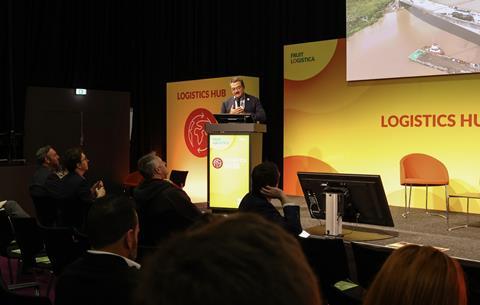Manuel Laborde Barriga of Uniban took to the Logistics Hub stage to speak about the impact of the new Port of Antioquia

Puerto Antioquia, a multi-purpose, deepwater terminal located along Colombia’s northern coast, was the subject of discussion during a Logistics Hub session on the final day of Fruit Logistica.
Manuel Laborde Barriga of Colombia’s largest banana exporter, Uniban, highlighted how the new inland port – located on the Gulf of Urabá, in the region of Urabá Antioquia – would reduce transit times to its markets in Europe and make its overseas business more competitive and more sustainable.
The port is also expected to bring significant benefits for exporters of other key products such as avocados and mangoes.
Barriga pointed out that for 60 years produce from Urabá had been shipped in containers upriver on barges to the ocean, where it was loaded using cranes, limiting speed and efficiency.
However, the Port of Antioquia would be a game-changer for the region’s logistics, he said.
“It is a 650,000 TEU multi-purpose terminal, 6.6mn tonnes annually, that is about 35 per cent-owned by the banana industry,” Barriga told the visitors in attendance. ”It is an entirely privately owned and privately funded operation, costing about US$800mn with construction taking about two-and-a-half years.
“We’re very proud and very excited about what the port will do,” he continued. “This will save 300km of inland freight to the highest population areas in Colombia.
“It will change the supply chains of coffee, avocados, citrus – anything that was having to go those 300km further.
”And this is not 300km on the Autobahn. This is 300km through the Andean mountain chain, so the savings in fuel and time for the trucks are going to be fantastic.”
The port would also create greater opportunities for European exporters, Barriga commented, with the purchasing power of the middle class in Colombia increasing.
He also outlined how the location of Puerta Antioquia in the Gulf of Urabá meant that conditions such as wind and tide were moderated.
“We expect this project to increase the opportunities and change the capabilities for all our partners and stakeholders, to use this as a source of food, fruit, dry cargo and everything else,” Barriga added.
”It will change the history of Colombia, and supply chains out of northern Latin America.”



